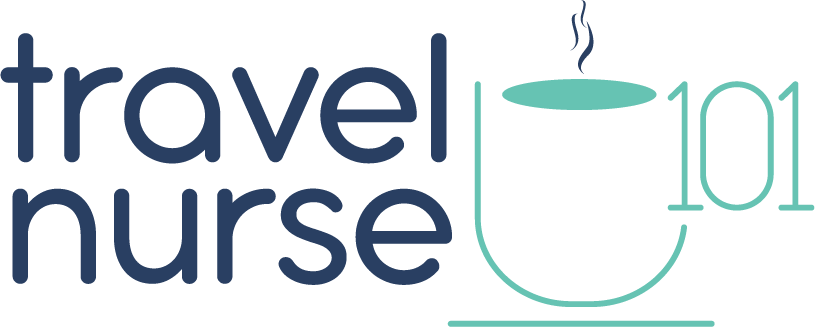If you’ve ever found yourself mid-shift thinking, “There has to be more than this,” or dreaming of a fresh start in a new city, travel nursing may be exactly what you’re looking for. I’ve been there myself and now I help nurses like you take that leap with clarity, confidence, and support.
But what exactly is healthcare travel? Who qualifies? And how do you know if this path is the right one for you? Let’s break it all down, step by step, so you know what to expect before you jump in.
And if you’re ready to learn how to become a travel nurse, stick with me. I’ll show you how to work with me one-on-one to create a personalized travel nurse roadmap built around your goals.
What Is Healthcare Travel?
Healthcare travelers are professionals hired by facilities to fill gaps in staffing. This could be due to seasonal patient surges, leaves of absence, or chronic staffing shortages. These travel contracts are usually around 13 weeks but can vary in length.
While many assume travel healthcare is just for nurses, a wide range of professionals are in demand. These include registered nurses, licensed practical nurses, surgical techs, respiratory therapists, radiology techs, and allied health professionals, among others.
Travel Nurse Across America (TNAA), one of the agencies I’ve partnered with and highly recommend, places travelers in all 50 states. They also welcome Canadian RNs who meet licensing requirements. However, this blog will focus only on U.S.-based assignments, as international contracts come with an entirely different set of requirements—and TNAA does not currently place them internationally.
Is Travel Nursing Right for You?
Travel nursing might be a great fit if you’re burned out in your current staff job, craving a new challenge, wanting to explore the country, or focused on financial goals like saving for a home or paying off debt. Many travelers also choose this path during transitional seasons of life, such as becoming an empty nester or needing a fresh personal start.
Before you jump in, I encourage you to ask yourself: What’s my “why”?
Are you pursuing more freedom in your schedule? Looking for a way to reignite your passion for nursing? Hoping to reset emotionally while exploring a new location? Identifying your deeper motivation will help guide your decisions and keep you grounded during the ups and downs of travel life.
Still not sure? That’s exactly what my mentor sessions are for. I help new and aspiring travelers assess their goals, explore options, and create an action plan that fits their lifestyle and priorities.
How To Become a Travel Nurse
Before you apply, there are a few foundational items you’ll need to have in place:
- 1-2 years of recent bedside experience in your specialty
- An updated resume and completed skills checklist
- Current licenses and certifications
- Up-to-date immunization records
If you’re still in a staff position, it’s a great idea to begin talking to a mentor early. This gives you time to ask questions, gather documents, and explore contract opportunities without pressure.
Creating Your Traveler Profile
Once you’re ready, your agency will help you create a traveler profile. This is essentially your professional portfolio that facilities will review when considering you for assignments.
You’ll begin working with several key people at your agency, including your recruiter, a compliance specialist, a licensing coordinator, and possibly a housing expert. Each of these roles plays an important part in getting you placed and onboarded.
One of the most important relationships you’ll have is with your recruiter. A strong recruiter can advocate for you, answer your questions honestly, and keep your best interests front and center. In my mentor sessions, I teach you how to spot the red flags—and the green lights—when choosing who to work with.
Understanding Travel Nurse Pay
Travel healthcare can be financially rewarding, but it’s important to understand how compensation works.
You’ll typically receive a weekly paycheck composed of taxable hourly wages and non-taxable stipends for housing, meals, and incidentals. However, pay structures vary by agency, location, and specialty, so it’s crucial to read contracts carefully.
I always recommend having a savings cushion of at least 4-6 weeks of expenses, just in case of delays or unexpected cancellations. Flexibility with location and shift preferences can also improve your pay and job options.
TNAA is one agency that offers highly competitive compensation along with day-one health insurance, paid time off, mental health resources, and tuition reimbursement—benefits that can really add up.
If the pay breakdown part sounds overwhelming, don’t worry. In mentor sessions, I walk through real contract examples and show you how to evaluate pay packages so you know exactly what you’re signing up for.
After You Accept the Offer
Once you accept a position, the real preparation begins. You’ll go through onboarding, which includes background checks, drug screening, documentation, and sometimes additional facility-specific training modules.
At the same time, you’ll arrange your housing. You can either accept agency-provided housing or take a stipend and find your own. If it’s your first assignment, working with a housing specialist can make things so much less stressful.
You’ll also want to plan for life logistics at home-things like mail forwarding, pet care, medical records, and setting up a travel-friendly budget.
This part of the process can feel like a whirlwind, but you don’t have to navigate it alone. I’ve helped many first-time travelers walk through this phase—right down to the packing list.
What to Expect in Your First Week
The first week of your assignment typically includes:
- Orientation and EMR training
- Getting your badge, logins, and schedule
- Shadowing on your unit with a preceptor
Each facility does things a little differently, but expect to feel like the “new kid” for at least a few days. That’s totally normal.
My best advice? Show up early, ask questions, and introduce yourself to leadership. You’ll feel more comfortable and supported when issues arise later in the contract if people already know who you are.
What If Something Goes Wrong?
One of the most common fears for new travelers is, “What happens if something goes wrong?”
Here’s the truth—things can happen. A contract might get canceled. The unit might not be what you expected. You might feel homesick or overwhelmed. That doesn’t mean you failed—it means you’re human.
What matters most is that you have the right support system in place. When my very first contract ended early, I panicked. But my recruiter stepped in, found another assignment, and had me back to work within a week or two. That kind of support is why choosing the right agency and recruiter is so important—and why I talk about this at length during mentor sessions.
Just as crucial? Having access to a dedicated clinical team. Things come up on assignment—clinical questions, policy confusion, unsafe ratios—and having experienced nurses available to guide you in real time can make all the difference. You never want to feel like you’re figuring things out alone in the middle of a shift. A strong clinical support team can be your lifeline when you need answers or advocacy fast.
Brandy’s Top Tips for New Travelers
- Be flexible—but know your worth
- Don’t wait for the “perfect” time—it may never come
- Build relationships everywhere you go
- NEVER burn a bridge
- Keep all your documents organized and backed up
- Learn from someone who’s been there—mentorship matters
Watch My On-Demand Healthcare Travel 101 Webinar
If you want a breakdown of everything you need to know to get your travel nurse career started, watch my Healthcare Travel 101 webinar. I partnered with TNAA to present everything first-time travelers need to know about launching a successful career.
Watch on demand now to get answers to your questions!
Ready to Take the Leap?
If your gut is telling you it’s time to explore something new, listen to it. Travel nursing can open doors, re-energize your career, and give you the freedom you’ve been craving—but it’s even better when you’re not doing it alone.
Whether you’re still exploring the idea or ready to go, I’d love to help. You can book a one-on-one mentor session with me, and together we’ll build a customized plan that makes this leap feel a lot less scary—and a lot more exciting.
You’ve got this—and I’ve got you. Happy Travels!


